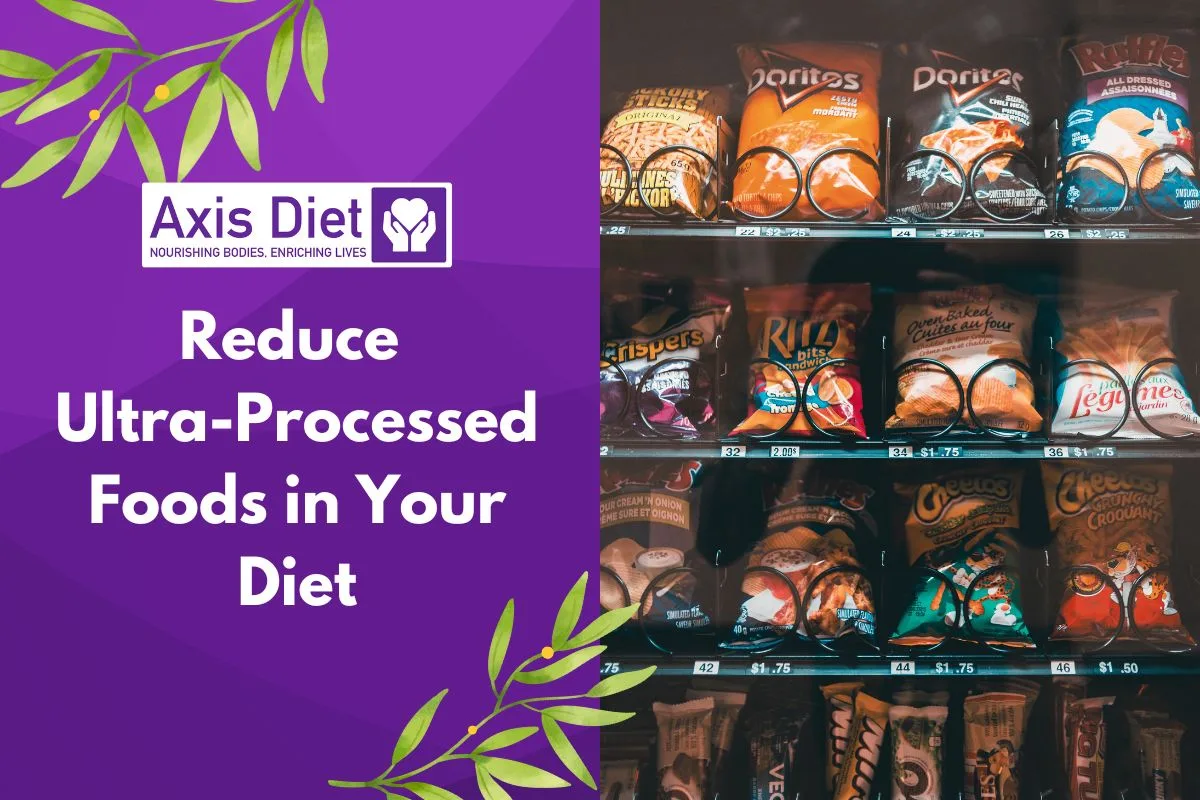In today’s fast-paced world, convenience often dictates our food choices. This shift has led to an increased consumption of ultra-processed foods, which can have adverse effects on our health. As a community dedicated to promoting healthier lifestyles in India, we at Axis Diet understand the importance of making informed dietary choices. Let’s start by understanding the different types of food processing and then dive into ten practical tips to reduce ultra-processed foods in your diet.
Understanding Food Processing: Ultra-Processed, Processed, Refined, Unrefined
- Ultra-Processed Foods: These are industrial formulations typically made from five or more ingredients. They often contain additives like artificial colors, sweeteners, preservatives, and emulsifiers. Examples include soft drinks, packaged snacks, and instant noodles.
- Processed Foods: These foods have been altered in some way during preparation. Processing can include canning, freezing, refrigeration, dehydration, and aseptic processing. Examples include canned vegetables, frozen fruits, and dairy products.
- Refined Foods: Refined foods are processed to remove certain parts of the original food. Common refining processes include milling grains to make white flour or refining sugar cane into sugar. The refining process often removes fiber and nutrients.
- Unrefined Foods: These are foods in their natural or whole form, with minimal processing. They retain most of their fiber and nutrient content. Examples include whole grains, fresh fruits, and vegetables.
The Harmful Impact of Ultra-Processed Foods
Understanding why ultra-processed foods can be detrimental to our health is crucial in making informed dietary choices. Here are some key reasons:
- High in Unhealthy Ingredients: Ultra-processed foods often contain excessive sugar, salt, unhealthy fats, and artificial additives, contributing to obesity, diabetes, and heart diseases.
- Low Nutritional Value: These foods are typically low in essential nutrients like fiber, vitamins, and minerals.
- Risk of Chronic Diseases: Regular consumption is linked to chronic diseases such as obesity, heart disease, and type 2 diabetes.
- Negative Impact on Gut Health: They can disrupt the healthy balance of gut microbiome, essential for digestion, immune function, and mental health.
- Increased Caloric Intake: The palatability of these foods often leads to overconsumption and weight gain.
- Addictive Qualities: The combination of sugar, fat, and salt in many ultra-processed foods can make them addictive, leading to unhealthy eating patterns.
- Impact on Mental Health: There is emerging evidence suggesting a link between ultra-processed food consumption and mental health issues like depression and anxiety.
- Environmental Impact: The production of ultra-processed foods has a higher environmental footprint, affecting climate change and natural resources.
10 Tips to Reduce Ultra-Processed Foods
1. Embrace Traditional Indian Cooking
Indian cuisine is rich in unrefined and wholesome foods. Emphasize traditional recipes that use whole grains, legumes, and fresh vegetables. For example, prefer a homemade roti made from whole wheat over store-bought white bread.
2. Plan Your Meals
Planning meals in advance can reduce dependency on convenience foods. Plan a weekly menu that includes a variety of fresh, unrefined foods. Incorporate seasonal fruits and vegetables for added nutritional benefits.
3. Read Labels Carefully
Learn to read and understand food labels. Look for products with fewer ingredients, and avoid those with added sugars, salts, and artificial preservatives.
4. Cook at Home
Cooking at home allows you to control the ingredients and avoid unnecessary additives found in many ultra-processed foods. Experiment with herbs and spices for flavor instead of relying on packaged sauces and seasonings.
5. Make Smart Snacking Choices
Opt for whole fruits, nuts, or yogurt instead of packaged snacks. Roasted chana (chickpeas), makhana (fox nuts), or a handful of almonds can be excellent snack options.
6. Limit Sugary Beverages
Replace soft drinks and packaged juices with healthier alternatives like infused water, fresh lime soda, buttermilk, or green tea.
7. Upgrade Your Breakfast
Start your day with nutrient-rich options like poha, upma, idli, or oatmeal, rather than processed cereals or instant mixes.
8. Shop Wisely
Focus on purchasing fresh produce and whole foods. Avoid the aisles with processed and packaged foods in grocery stores.
9. Experiment with Whole Grains
Incorporate a variety of whole grains like bajra, jowar, and ragi into your diet. They offer more nutrients and fiber compared to refined grains.
10. Practice Portion Control
Even when consuming processed foods, practice portion control. This can help limit the intake of excess calories, sugars, and unhealthy fats.
Conclusion
Reducing ultra-processed foods in your diet can significantly improve your overall health. By making small, gradual changes and embracing the rich diversity of Indian cuisine, you can enjoy a healthier lifestyle without sacrificing flavor or tradition. Remember, the key is moderation and making informed choices that benefit your health and well-being.
Axis Diet is dedicated to empowering individuals with knowledge and practical advice for healthier living. Our articles, grounded in research and expert insights, aim to simplify complex nutritional concepts, offering a comprehensive understanding of various aspects of diet and wellness. While these articles are informative and a great starting point for anyone looking to improve their health, they are for informational purposes only.
For personalized, professional guidance tailored to your unique health needs, we encourage you to consult with Axis Diet’s registered dietitians. Reach out to us at https://www.axisdiet.com/contact/ for expert personalized guidance on your nutritional journey.
Comments are closed.






[…] Vitamin B12 into your diet can be achieved through various food sources. Non-vegetarians can include seafood, such as salmon and sardines, and lean meats like […]